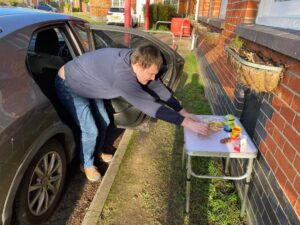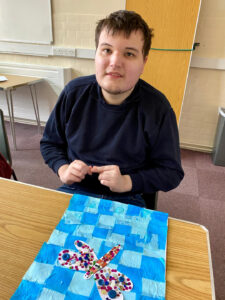The Joy of an Unexpected Breakthrough

The joy of an unexpected breakthrough is worth waiting for. Guest blogger Mark Arnold felt that joy when his son James recently overcame his anxiety and did something he hadn’t done for five years.
Most of the time, a change of plan is inconsequential. It may be hard in that moment, but the effect of the change is minimal. Occasionally, though, a change of plan can be transforming and have a lasting, life-altering impact.
This is the story of the joy of an unexpected breakthrough.
James is twenty. A little over five years ago, epilepsy arrived, adding to diversities and additional needs that include autism and learning difficulties. The onset of epilepsy was more profound than we imagined at the time, as it sparked overwhelming feelings of anxiety. For fourteen months, James was unable to go outside. A breakthrough helped him to return to some familiar places that held positive memories, but nowhere new.
Last week that changed.
We took James to his weekly craft session at the local community center, a routine that’s been in place since September. Due to James’ anxiety, he won’t leave the car when we get there, so the team brings the craft to him. Since September we’ve made collage pictures of dinosaurs, elephants, Christmas trees, lions, sharks, and hedgehogs. But in the car, not in the classroom.
Until last week. Until the breakthrough.
That day we parked near the entrance to the community center and used a new technique to coax James out of the car. We put a small folding table about three feet away from James’ door and put things James likes on it—iced gingerbread, crisps, his Minion nightlight, Play-Doh. Our hope was that James would step outside, collect something, and return to the car. We’ve had some positive results.
Last week James took us all by surprise.
Donna, a team member, passed the tray with the craft activity into the car, but there had been a mistake. She brought the craft from the week before. Donna and my wife Clare returned to the classroom to find a new craft activity. While we were waiting, I encouraged James to collect something from the table.
To my delight, he did so three times!

The third time, he stood by the table looking toward the entrance to the community center. I had to pull myself together and act fast. I slid out of the car on James’ side and gently encouraged him to walk to the entrance. Soon we were at the automatic doors. On we went into the foyer area where the sight of Clare helped him to move on again. Before we knew it, James was sitting at a table in the classroom. He sat at a table! He had a wonderful time creating a dragonfly picture. He was happy and engaged throughout. The challenge was getting him to stand up and return to the car an hour later. We were amazed, thrilled, proud of James, and slightly shocked. This was a mountain top. There will be valleys again.
But the view from that mountain top was magnificent!

Many families like ours have children who have been housebound for years. If that is you, let James’ story gives you hope. Hope that your child will be supported and have the joy of an unexpected breakthrough too. Hope of a mountain top moment sooner than you think.
Do you like what you see at DifferentDream.com? You can receive more great content by subscribing to the monthly Different Dream newsletter and signing up for the daily RSS feed delivered to your email.
By Mark Arnold
Mark Arnold is the Additional Needs Ministry Director at Urban Saints, a leading national Christian children’s and youth organization. He is co-founder of the Additional Needs Alliance, a national and international advocate for children and young people with additional needs or disabilities. Mark is a Churches for All and Living Fully Network partner, a member of the Council for Disabled Children and the European Disability Network. He writes an additional needs column for Premier Youth and Children’s Work (YCW) magazine and blogs at The Additional Needs Blogfather. He is father to James, who has autism spectrum condition, associated learning disability, and epilepsy. To find out more about how Mark’s work can help you, contact him at: marnold@urbansaints.org or @Mark_J_Arnold
Subscribe for Updates from Jolene
Related Posts
How Do I Discern if Medication Is Best for my Child’s Behavioral Needs?
Heather Braucher explains her answer to the question, “How do I discern if medication is best for my child’s behavioral needs?”
How Do I Teach my Kids to Interact with People Who Have Disabilities?
Jolene gives practical pointers for people who ask, “How do I teach my kids to interact with people who have disabilities?”
Choosing Acceptance and Advocacy as Parents of Kids with Disabilities
Choosing acceptance and advocacy as parents of kids with disabilities can be hard, but it’s necessary to our kids and to ourselves.






0 Comments